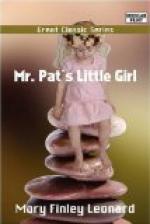OLD ENEMIES.
“Kindness nobler ever than revenge.”
If things came right in the Forest, it was not through effort. One had simply to surrender to its spell, to breathe in the beauty and the calm, to live there, as the president had said.
Celia’s thoughts were interrupted by Sally’s hurried entrance.
“Laws a mercy! Miss Celia, honey, Mrs. Whittredge’s in the parlor. I come mighty nigh askin’ her what she wanted in dis yere house.”
Celia looked up in astonishment. Mrs. Whittredge! What could it mean? “And she asked for me?” she repeated.
“I done tol’ her your mamma was sick, but she ’lowed ’twas you she wanted.”
Celia recovered herself. “Very well, Sally,” she said, but it was with a beating heart she walked the length of the hall. Her enemy! What did it mean?
Mrs. Whittredge, her heavy veil thrown back a little, stood beside the table in the centre of the room.
“You are surprised, Celia,” she said, as they faced each other, “but there is something I wish to say to you. No, I will stand, thank you.”
Celia waited, feeling, even in the midst of a tumult of emotion, the tragic beauty of the dark eyes.
Mrs. Whittredge seemed to find words difficult. She looked down at the table on which her right hand rested. “I have made many mistakes,” she began, “but—I have never meant to wrong any one. At the time of my husband’s illness I—there were things said—I did not agree with Dr. Fair, and I may have gone too far. It is my misfortune to be intense. I was very unhappy. I thought the case was not understood. It was my mistake.” She paused.
“And my father died, crushed by the knowledge that he was unjustly blamed for the death of his friend! The discovery of your mistake comes too late.” Celia’s voice was tense with the stored up pain of those two years.
Mrs. Whittredge drew back. “You are hard,” she said. “We look at things from different standpoints. I have told you I wish to wrong no one, but—ah, your father was cruel—cruel to me!”
“My father was never cruel,” Celia cried.
“Listen! He told me I was killing my husband. I, who worshipped him. I, who—God knows—would have given my life to—” she broke off in a passion of grief, sinking into a chair and burying her lace in her hands.
Celia stood abashed and trembling before this revelation of a sorrow deeper than her own,—the sorrow of self accusation and unavailing regret.
“Have you been wronged, are you hard and bitter? Seek the Kingdom of love. Your Heavenly Father knoweth. He will take care of your cause.” For a moment Celia struggled against the wave of pity that was sweeping over her, then forgetting everything but the suffering of this woman bowed before her, she knelt by her side.
“Forgive me,” she whispered. “I do not want to be hard. I, too, have suffered, though not like you. Perhaps we wronged the dead by keeping bitterness in our hearts. Perhaps to them it is all made right now. I will forgive; I will try to forget.”




